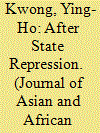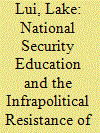|
|
|
Sort Order |
|
|
|
Items / Page
|
|
|
|
|
|
|
| Srl | Item |
| 1 |
ID:
188953


|
|
|
|
|
| Summary/Abstract |
The Chinese government has imposed the National Security Law which has resulted in Hong Kong formally entering into a phase of movement abeyance. By analysing 3377 posts on LIHKG Internet forum, this article re-explores the online protest attitude during this movement abeyance. The findings indicate that content creators are more attentive in regard to criticizing the legislation and pro-Beijing figures, followed by seeking international support and calling for unity. Users are more ‘participative’ in calling for mutual destruction between the authorities and people, initiating mutual support and seeking emigration. This study provides new perspectives on the study of movement abeyance.
|
|
|
|
|
|
|
|
|
|
|
|
|
|
|
|
| 2 |
ID:
188955


|
|
|
|
|
| Summary/Abstract |
In his seminal book Exit, Voice, and Loyalty, Hirschman suggests that loyal members are less likely to exit when dissatisfied with the performance of the organization. In the context of a political regime, however, we argue that loyalty may actually encourage exit because loyal members are more sensitive to the performance decline of the regime. Using an original survey conducted in Hong Kong, we show that survey respondents with a stronger local identity have greater migration intentions. We also find that the heterogeneity of perceived political changes plays a significant role as a mediator. We discuss the political implications for Hong Kong.
|
|
|
|
|
|
|
|
|
|
|
|
|
|
|
|
| 3 |
ID:
188949


|
|
|
|
|
| Summary/Abstract |
The 2019 Anti-extradition Law Amendment Bill Movement is the largest series of protests in Hong Kong’s history. This Special Issue includes eight articles written by experts. It aims to examine recent developments in Hong Kong, their impacts on the society, and implications to the city’s future.
|
|
|
|
|
|
|
|
|
|
|
|
|
|
|
|
| 4 |
ID:
188951


|
|
|
|
|
| Summary/Abstract |
Following the post-material shift of post-industrial societies, an evolution in citizenship norms from dutiful citizenship to engaged citizenship has occurred. This paper examines how people’s attitudes towards the Anti-Extradition Bill movement are related to these two citizenship norms. Using data collected from a population survey (N = 817), this paper shows that the people supporting the movement and radicalism perceived dutiful citizenship to be less important and engaged citizenship to be more important. The compatibility between the two sets of citizenship was found to be stronger among the people who supported the movement, despite the frequent appearance of unlawful behaviour in the movement. To explain the moderating effect, observations from focus group interviews revealed that some people had a traumatic experience in the movement. This trauma led them to doubt the legitimacy of the authority. Therefore, although they perceived dutiful citizenship to be important, they could also support various unlawful behaviours that occurred in the movement.
|
|
|
|
|
|
|
|
|
|
|
|
|
|
|
|
| 5 |
ID:
188956


|
|
|
|
|
| Summary/Abstract |
The resilience of non-democratic regimes in the past decades demonstrates that some authoritarian regimes have figured out ways to consolidate regime support without democratic elections. Hong Kong is a remarkable case of “legitimacy without democracy” as the system of government enjoyed a certain level of legitimacy since colonial days without being democratically elected. Using Hong Kong as a case and based on data from several waves of Asian Barometer Survey (ABS), this study analyzes the impact of citizens’ evaluation of the economic conditions, perception of freedoms, perceived procedural justice and institutional trust, and stability concerns on diffuse regime support in Hong Kong. There are three key findings of this study. First, economic performance is not a significant predictor of diffuse regime support in the case of Hong Kong, whereas, second, institutional trust and perceived civil liberties are. Finally, we found indirect evidence for the role of stability in shaping regime support, although its importance seems far less important than institutional trust and civil liberties
|
|
|
|
|
|
|
|
|
|
|
|
|
|
|
|
| 6 |
ID:
188954


|
|
|
|
|
| Summary/Abstract |
This study highlights political parenting after the introduction of National Security Education (NSE) in Hong Kong amid waves of political repression after the anti-extradition movement in 2019–2020. Do parents conform to or resist the new nationalistic, China-focused education curriculum that is inconsistent with their ideals of parenting and children education? How do parents navigate these changes? Based on the interviews with 26 parent-stayers in Hong Kong, I uncover that beneath the public transcripts of compliance, there are low-profile forms of resistance through (1) political parenting—nurturance of acquiescent but critical thinkers and resistance to nationalization by preparing their children to embracing cosmopolitan values in pursuit of a migration dream and (2) parents’ anonymous attempts to break the silence by using other dominant but depoliticized discourses to reconfigure their resistance to NSE. In so doing, they avoid provoking the authorities, while continuing to resist. These hidden transcripts are drawn from the cultural repertoires of parenting and liberal democracy in the pre-National Security Law (NSL) period.
|
|
|
|
|
|
|
|
|
|
|
|
|
|
|
|
| 7 |
ID:
188952


|
|
|
|
|
| Summary/Abstract |
In recent decades, Hong Kong witnessed a number of protest movements that drew high levels of participation, most of which revolved around political issues. Why did ordinary citizens protest? What were the underlying factors that motivated Hongkongers to protest? We argue that post-materialism and grievances toward the government increase the selective expressive benefits for individuals to participate in protests. We illustrate that the two factors contribute to the protest movements in Hong Kong in general. Using the World Values Survey data, we found that post-materialism interacted with grievances toward the political system to increase Hongkongers’ propensity to protest. Our findings have important implications for the 2019 Anti-Extradition Law Movement in Hong Kong.
|
|
|
|
|
|
|
|
|
|
|
|
|
|
|
|
| 8 |
ID:
188950


|
|
|
|
|
| Summary/Abstract |
This article examines the nature of the legal system in Hong Kong and its process of autocratisation under the Chinese sovereign. This article suggests that, in colonial and post-colonial times, Hong Kong’s legal system follows the global trend of autocratic legalism that empowers the executive branch to use laws and courts to achieve the government’s political goals. With the recent imposition of the national security law, the political and legal systems of Hong Kong are further autocratised beneath the veil of securitisation, facilitating China’s authoritarian governance in Hong Kong.
|
|
|
|
|
|
|
|
|
|
|
|
|
|
|
|
| 9 |
ID:
188957


|
|
|
|
|
| Summary/Abstract |
Why does the Hong Kong diaspora mobilize transnationally to support the Anti-ELAB Movement back home? How do overseas mobilizations help sustain movement during its abeyance period? Building on the theoretical grounding from transnational movement and diaspora studies, I identify four dimensions of transnational ties that diasporas have with their homeland—relational, political, cultural, and identity and value—and examine their effect on diasporic activism in the host countries. Using original survey data on Hong Kong Americans and interviews with members of overseas Hongkonger groups, I demonstrate that attachment to Hong Kong culture and localist values are the strongest drivers for transnational engagement.
|
|
|
|
|
|
|
|
|
|
|
|
|
|
|
|
|
|
|
|
|